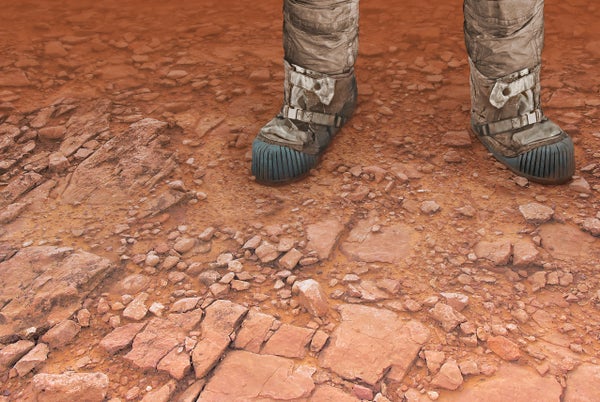With Jeff Bezos and Richard Branson recently completing their pioneering space flights that could set the stage for future space tourism, it is worth taking a look at what might be involved for the human exploration of Mars, even though it’s likely decades away.
Elon Musk is perhaps the best-known advocate for going to Mars, but the idea is decades old. In a 1966 Annals of the New York Academy of Sciences paper, Gordon R. Woodcock of the George C. Marshall Space Flight Center theorized how the Saturn V launch vehicle—at the time in development for the Apollo lunar missions—could be used for a Mars exploration. Technical challenges aside, as we continue to expand our exploration of Mars, there is a broader ethical question at play. What might be the lessons of past voyages of discovery and colonization that we should be thinking about? History provides us with many cautionary tales.
Human exploration has led to many extraordinary new discoveries, but it has also led inexorably to the appropriation and exploitation of natural as well as human resources. The desire to gain control over various commodities such as spices, sugar and oil, propelled both global discovery and the drive for political and economic domination. During the age of empire, European nations derived their wealth and power from colonizing various global regions and controlling land, labor and military power to advance their own interests.
On supporting science journalism
If you're enjoying this article, consider supporting our award-winning journalism by subscribing. By purchasing a subscription you are helping to ensure the future of impactful stories about the discoveries and ideas shaping our world today.
After the early European settling of what would become the United States, the American colonists declared their independence from an unjust English authority and created the Constitution by which our modern society functions. This did not, however, prevent the settlers from referring to native people as savages and excluding them from the assertion of rights to liberty and happiness.
Then there is the question of “ownership”: does the first country that plants its flag on the surface of another world get to claim ownership? Such claims have been made many times before, and they do not bode any better for the future of space exploration than they have for human history on Earth. Clearly if we are to settle another planet—and likely it will be a multinational effort if we do—we’ll need to write a constitution for Mars, one that would learn from past mistakes, much like in the assignment set by Yale’s Hélène Landemore in a recent course on the political theory of constitutions.
Consider also the issue of Mars’ fragile ecosystem. The planet certainly has a hostile environment for human life, but on Mars, humans will be the invasive species with all that implies. The native occupants of the newly decolonized land of America were quickly decimated by systematic warfare and new diseases as the new settlers expanded their territory. The natural environment with which Native Americans had established a harmonious and symbiotic relationship, was similarly despoiled by the twin logic of expropriation and colonization that spread under the logic of manifest destiny.
Biological life aside, it is possible that Mars has minerals that could have extraordinary properties ideal for future development. We have seen on Earth how mining has had devastating environmental impacts; to think there would be anything less of an impact on the Martian environment is disingenuous.
Based on early missions and recent images sent from NASA’s Ingenuity and China’s Zhurong rover, the Martian landscape appears to be a frigid desert, with no visible trace of life. But the same could be said by aliens if they were to land in the vast desolation of the Gobi Desert. Given the first impression of Mars from pictures sent back by robotic explorers, notions of hostile creatures such as those envisioned in H.G. Wells’ novel The War of the Worlds, and in movies such as Alien and Independence Day, seem unlikely. But we should be wary of characterizing “life” based solely on Earthly experience.
Stephen Hawking once warned that contact with an extraterrestrial civilization could result in the inevitable destruction of our own. Such an idea is not so far-fetched when you consider the current cost in human lives and economic devastation from a new Earth-based virus that blindsided us when we weren’t looking. While it is unlikely that we will be invaded by multilimbed creatures bent on Earth’s destruction using death rays, we cannot rule out the possibility that there could be a kernel of reality in Hawking’s prophecy.
The technological achievements of the teams at NASA and other space agencies are certainly to be applauded. And the contributions of the related research stemming from the fields of physics, material science, chemistry, medicine and many others is potentially limitless.
As we look to exploring worlds beyond our own, we need to begin now to look at history—while also adopting a more anthropological lens—to consider how best to engage with radically different life forms, cultures and environments. We may be capable of writing a new constitution and committing ourselves to an entirely new form of engagement with other places (and perhaps peoples), but we should begin with the presumption that we need to counter our own invasive impact on another planet that may be completely defenseless—before we embark on a new era of galactic exploration and imperial conquest.
